Wall Street Tumbles on Hawkish Fed Expectation
- Wall Street weighs on Hawkish Fed expectation and trade with strong downside pressure.
- The yen strengthened as speculation of a BoJ January rate hike resurfaced.
- Oil prices continue to surge as cold weather forecasts boost fuel demand.
Market Summary
Wall Street closed sharply lower in the last session, weighed down by hawkish Fed expectations. With shortened trading hours ahead of the New Year holiday, the equity market is anticipated to remain stable in thin trading.
Meanwhile, the U.S. dollar is set to end 2024 with over 6% gains, despite its recent sideways trend. Traders will closely monitor the upcoming U.S. PMI data and Initial Jobless Claims due on Thursday, which could provide further insights into the dollar's strength.
In the currency market, the Japanese Yen stood out, supported by Friday’s Tokyo CPI reading of 3%, which has revived speculation of a January BoJ rate hike, boosting the currency. In contrast, most other currencies remained relatively flat.
In commodities, gold slid below its critical support level at $2610, pressured by the strengthened dollar and hawkish Fed sentiment. Oil prices, however, held firm above $71.00, supported by cold weather forecasts that fuel demand expectations for heating supplies, providing buoyancy to crude prices.
Current rate hike bets on 29th January Fed interest rate decision:
Source: CME Fedwatch Tool
0 bps (91.4%) VS -25 bps (8.6%)
Market Movements
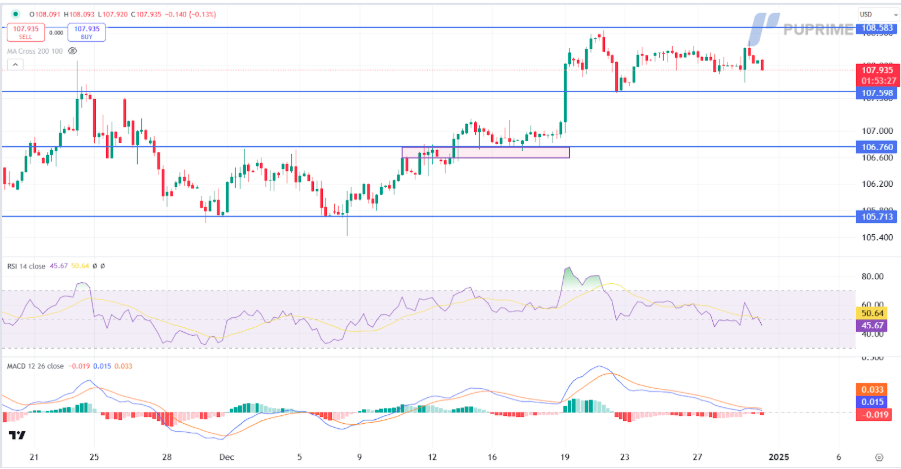
DOLLAR_INDX, H4
The Dollar Index remained in positive trajectory, supported by rising U.S. Treasury yields. The 10-year yield reached 4.625%, driven by expectations that President-elect Donald Trump’s policies—looser regulations, tax cuts, tariff hikes, and tighter immigration—will fuel growth and keep U.S. yields elevated in 2025. This outlook continues to strengthen the dollar in global markets.
The Dollar Index is trading flat while currently consolidating between support and resistance. MACD has illustrated increasing bearish momentum, while RSI is at 46, suggesting the index might edge lower since the RSI stays below the midline.
Resistance level: 108.60, 109.50
Support level: 107.60, 106.75
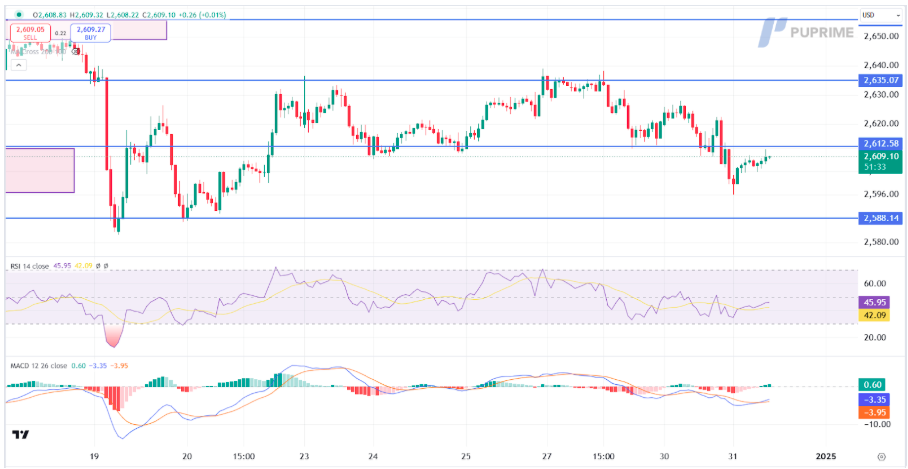
XAU/USD, H4
Gold prices declined as the U.S. Federal Reserve’s hawkish stance continued to push Treasury yields higher, reducing the appeal of non-yielding assets like gold. As is typical during the holiday season, trading volumes were low, and economic data releases were sparse, leading to subdued price action in gold. The lack of significant catalysts and reduced institutional activity contributed to the overall downward pressure on the metal, which finished the week lower.
Gold prices are trading lower following the prior breakout below the previous support level. Nonetheless, MACD has illustrated increasing bullish momentum, while RSI is at 46, suggesting the commodity might experience technical correction since the RSI rebounded from oversold territory.
Resistance level: 2610.00, 2635.00
Support level: 2555.00, 2590.00
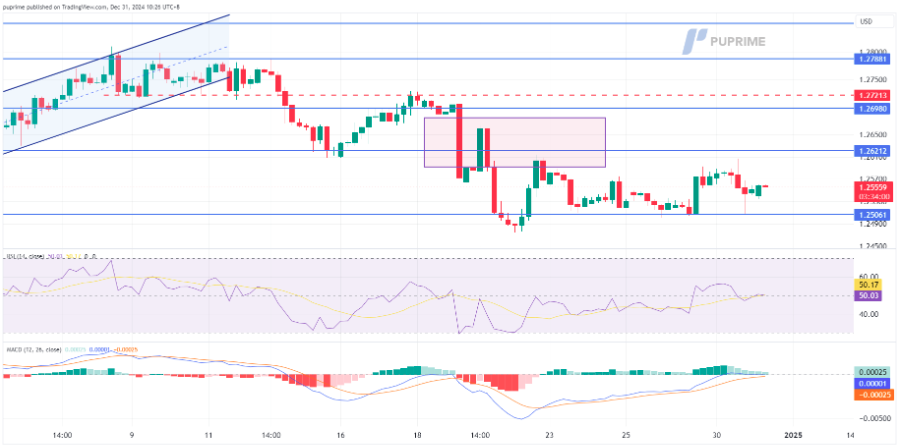
GBP/USD,H4
The GBP/USD pair experienced volatile swings, moving over 100 pips in the last session, and is currently trading below the 1.2600 level, signaling a bearish bias. Initially, the pair rose as the dollar weakened due to a technical correction. However, the greenback’s strong fundamentals ultimately supported a rebound, applying downward pressure on the Pound Sterling and forcing the pair to trade lower.
After a seesaw session, the GBP/USD pair fails to stand above its previous high level, which suggests a bearish bias for the pair. The RSI is currently hovering near the 50 level while the MACD is attempting to break above the zero line, suggesting that the bearish momentum is easing.
Resistance level: 1.2620, 1.2700
Support level: 1.2505, 1.2408
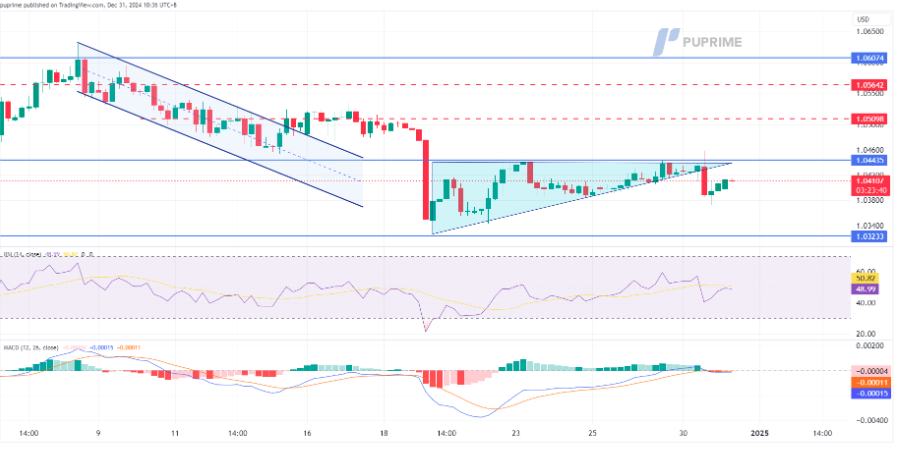
EUR/USD,H4
The EUR/USD pair breached its ascending triangle pattern, signaling a bearish bias. In the last session, the pair experienced a sharp decline, falling below the key psychological support level at 1.0400, which further reinforces the bearish outlook. The breakdown from this support zone suggests the pair may continue to face downward pressure, especially as the dollar remains supported by strong fundamentals and hawkish Fed expectations.
The pair has signalled a bearish signal after the pair has broken below form the ascending triangle pattern. The RSI slid in the last session while the MACD remained close to the zero line, suggesting that the bearish momentum is easing.
Resistance level: 1.0440, 1.0515
Support level: 1.0323, 1.0238
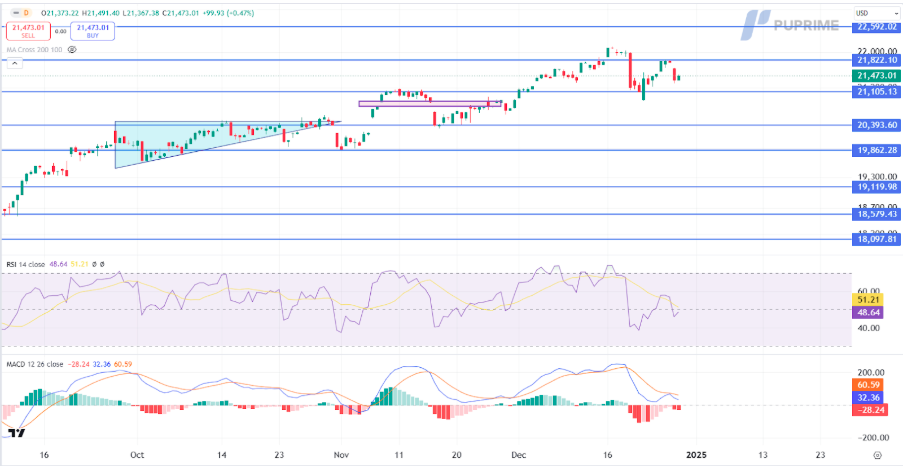
NASDAQ,H4
U.S. equity markets struggled to maintain momentum as high Treasury yields challenged lofty valuations. Wall Street remained mixed in thin holiday trading, with many investors opting for profit-taking amidst the absence of significant market catalysts. While China’s PMI surveys and the U.S. ISM report due later this week offer some potential for direction, the focus for 2025 will likely remain on Federal Reserve interest rate decisions and the growth trajectory of the tech sector. Investors are expected to maintain a cautious stance, awaiting clearer signals for the year ahead.
Nasdaq is trading lower following the prior retracement from the resistance level. MACD has illustrated increasing bearish momentum, while RSI is at 49, suggesting the index might extend its losses since the RSI stays below the midline.
Resistance level: 21820.00, 22590.00
Support level: 21105.00, 20395.00
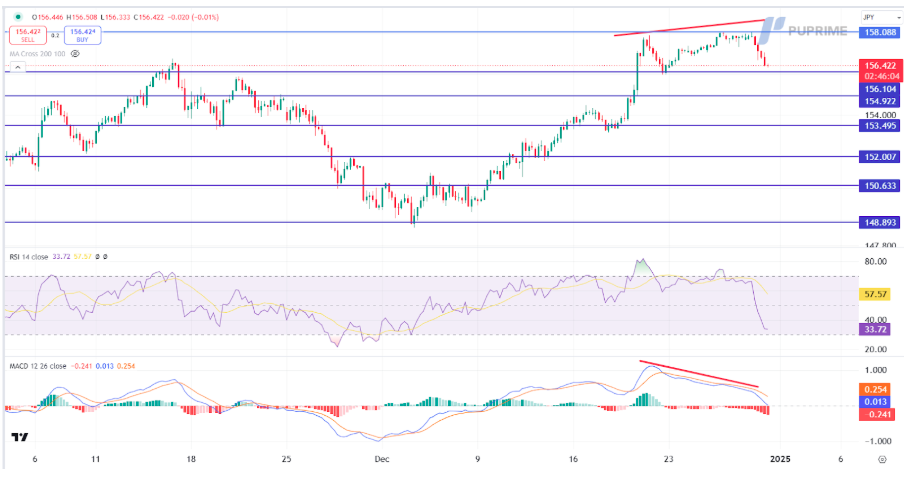
USD/JPY, H4
The Japanese Yen rebounded, influenced by the Bank of Japan’s December policy meeting, where some policymakers expressed confidence in a potential rate hike. The Bank of Japan also reduced its bond purchases. However, concerns remain about the yen's weakness, with Finance Minister Katsunobu Kato reiterating the possibility of intervention if the yen depreciates further.
USD/JPY is trading lower while currently testing the support level. MACD has illustrated increasing bearish momentum, while RSI is at 34, suggesting the pair might extend its losses after breakout since the RSI stays below the midline.
Resistance level: 158.10, 159.80
Support level: 156.10, 154.90
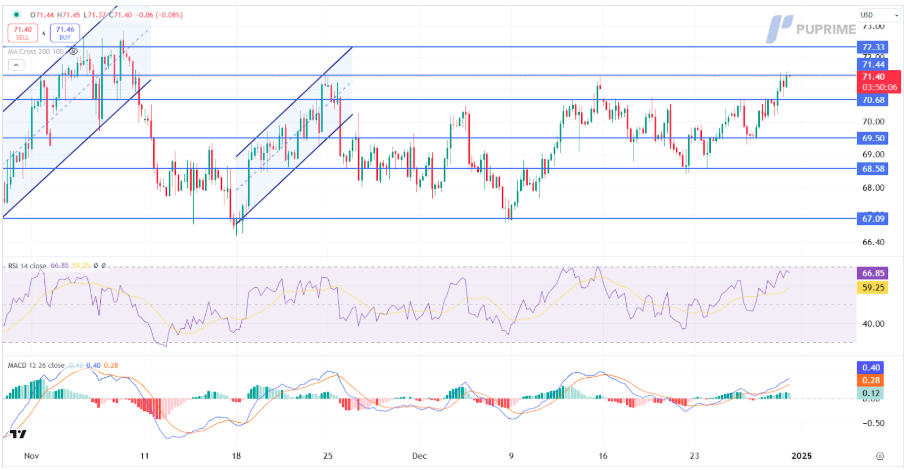
CL OIL, H4
Oil market prices settled higher in thin trading conditions, as investors anticipated a drop in temperatures across the U.S. and Europe, which could boost demand for diesel. The forecasted increase in heating degree days in both regions supports this view, and colder weather in January could further strengthen oil prices. Additionally, expectations of declining U.S. crude stockpiles, with an anticipated drop of around 3 million barrels, provide further support for oil prices. Despite these bullish factors, traders remain cautious about potential market volatility during the year-end period
Oil prices are trading higher while currently testing the resistance level. MACD has illustrated increasing bullish momentum, while RSI is at 67, suggesting the commodity might extend its gains after breakout since the RSI stays above the midline.
Resistance level: 71.45, 72.35
Support level: 70.70, 69.50



















